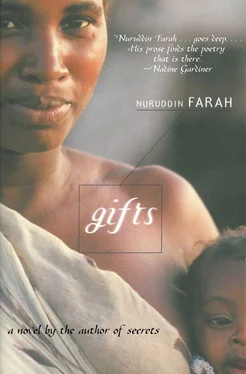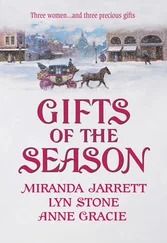Nuruddin Farah - Gifts
Здесь есть возможность читать онлайн «Nuruddin Farah - Gifts» весь текст электронной книги совершенно бесплатно (целиком полную версию без сокращений). В некоторых случаях можно слушать аудио, скачать через торрент в формате fb2 и присутствует краткое содержание. Год выпуска: 2011, Издательство: Arcade Publishing, Жанр: Современная проза, на английском языке. Описание произведения, (предисловие) а так же отзывы посетителей доступны на портале библиотеки ЛибКат.
- Название:Gifts
- Автор:
- Издательство:Arcade Publishing
- Жанр:
- Год:2011
- ISBN:нет данных
- Рейтинг книги:3 / 5. Голосов: 1
-
Избранное:Добавить в избранное
- Отзывы:
-
Ваша оценка:
- 60
- 1
- 2
- 3
- 4
- 5
Gifts: краткое содержание, описание и аннотация
Предлагаем к чтению аннотацию, описание, краткое содержание или предисловие (зависит от того, что написал сам автор книги «Gifts»). Если вы не нашли необходимую информацию о книге — напишите в комментариях, мы постараемся отыскать её.
Gifts — читать онлайн бесплатно полную книгу (весь текст) целиком
Ниже представлен текст книги, разбитый по страницам. Система сохранения места последней прочитанной страницы, позволяет с удобством читать онлайн бесплатно книгу «Gifts», без необходимости каждый раз заново искать на чём Вы остановились. Поставьте закладку, и сможете в любой момент перейти на страницу, на которой закончили чтение.
Интервал:
Закладка:
Once Duniya came to, the universe of her imagination was at her beck and call. She could now see Abshir properly, hear his deep voice, remember all his kind gestures, his unlimited generosity. It remained to her a mystery why she always accepted Abshir’s gifts, whereas she felt ill at ease receiving other people’s.
Abshir was a tall man, with a stoop, whose posture made him appear well over six foot. He was very dark with long limbs, a wide mouth and thick lips. For a man his age, he had a lot of hair, although a few grey hairs showed through. His hands were large, his fingers long. His eyes, when listening, shone with eager expectation. Abshir was a heavy smoker, a cigarette every quarter of an hour, and he had a dry cough. Abshir loved chewing raw garlic, a habit he shared with Nasiiba, and he and his niece were of a similar temperament, although Mataan resembled him more closely.
He had a gentle laugh, very soft, hardly audible. Now he was laughing because someone had told him he had been spared the bouquet-giving ceremony of a niece in white, with a bunch of famished roses.
Having seen the Vespa Mataan had borrowed from Waris’s cousin, Abshir offered to buy his nephew a motor scooter if he did well in his exam. When told that Duniya and the children would no longer be living in Qaasim’s flat, but in another in the city centre, Abshir asked if it was possible for him to buy a pied-a-terre, for which Duniya would be responsible, or live in. No wonder they had nicknamed him “ Scelaro,” He was fast.
He, Bosaaso and Mataan were sitting in the courtyard, chatting. The two older men had many friends in common, and each was inquiring of the other about them. Mataan listened attentively, his mouth gaping open, looking admiringly from one to the other. Bosaaso was thrilled to talk about the good times he and Abshir had enjoyed in Rome. How were Abshir’s Italian wife and two daughters? Were they still living in Trastevere or had they moved? What about Bosaaso’s Australian and South African friends, were they still there, working for the FAO?
“How’s Mire?” Abshir asked.
Bosaaso gave Abshir such a quick run-down of what Mire was doing that Mataan wondered if there wasn’t more to what Bosaaso and Mire were up to, coming all the way as they had done from Germany and the USA respectively, and donating their services to their country.
“I would love to see Mire,” said Abshir.
“He’s coming to dinner tonight,” said Bosaaso.
Abshir turned to Mataan, “Where are we having dinner tonight, Mataan?”
“Maybe Mother has organized something, but I don’t know.”
“Duniya is inviting us out tonight,” Bosaaso declared.
“Where?” Abshir’s eyes lit up eagerly.
After a pause, Bosaaso said, “Croce del Sud.”
Duniya joined them and stood silently in the parenthesis her arrival opened. Abshir took a loving look at her, then, as his sister sat down beside him, said to Bosaaso, “Is Croce still open?”
“It is,” said Bosaaso. “It has become a bit seedy, but some of the waiters are still there from the days before independence, and they still bow at the appearance of a white-face, because white hands offer better tips than dark ones. But you get excellent service if your dark hand offers a fifteen per cent tip, five per cent higher than the pink hand.”
Reminiscing, Abshir turned to Mataan and Duniya. “You know, we weren’t allowed to go anywhere near Croce del Sud in the fifties, when the Italians were the master race here. Nor were the waiters allowed to wear shoes.”
Duniya felt foolish interrupting the flow of the conversation with a question, but asked, “Why do Italians believe they are the ones who taught Somalis to wear shoes, as if the whole venture of their so-called higher civilization comprised a gimmicky habit of a pair of feet-covering objects, Abshir?”
“Why, I’ve never thought of that,” he said, self-censoriously.
“Neither had I,” Bosaaso added.
Then Abshir coughed, his ribs heaving. His chest exploded with a loud cough a second and a third time. He said, “Don’t anyone tell me to stop smoking, because I won’t.” And he smiled, wrinkling the corners of his eyes.
“No one will,” Duniya said.
“You mean Shiriye won’t?” Abshir queried, surprising everybody.
Duniya, who didn’t speak, thought of Abshir as Nasiiba’s kindred; but never mind.
After a pause, Abshir said to Duniya, “How is our half-brother, anyway?”
Duniya’s breathing rustled like silk touching rough skin, as she mumbled something brief and unpleasant about Shiriye.
“Do you think Shiriye will give me my share of the bridewealth which he is said to have collected from Zubair for your hand?” Abshir teased her. “Or half of what he got from Taariq?” He reached for her hand which he held in both his. In fondness.
“I doubt it very much,” said Duniya.
When Abshir coughed his dry cough a few more times, Duniya freed her hand from his hold. She left, excusing herself as though attending to an urgent matter.
“Tell me something about yourself,” Abshir said to his nephew.
“There is nothing to tell really,” Mataan responded shyly.
“How’s that?” said Abshir.
“He’s excellent at school, the best in mathematics, I’ve been told,” Bosaaso interjected.
Rather emphatically, Abshir said, “I see,” as if he knew a lot more than he was willing to give away Then he continued, “What do you want to study when you go to university, Mataan?”
“I haven’t decided,” said Mataan.
“You have one more academic year to go, haven’t you?” said Abshir.
Bosaaso said, “Plus two years, one in which he must do national service and a second year as an army conscript.”
“How is your Italian?” Abshir asked Mataan.
“Not good enough to study at an Italian university unless I do one of those very intensive courses they give in Perugia.” For Mataan, things were happening too fast. Uncle Scelaro was too quick, but he was too slow; even so he was responding with a heightened enthusiasm that suited the occasion.
Abshir said, “Or would you prefer to go to an English-speaking university, in the USA or Canada, I mean is your English good enough for you to take a course in mathematics?”
Mataan was not sure if he wished to take a degree in mathematics, but he didn’t say that. He was too intimidated and things were happening at a faster rate than he’d been used to.
“Well talk more then,” Abshir suggested, adding after an appropriate pause, and after looking from Bosaaso to Mataan, “I trust we can find a way to have him exempted from national and military service?”
“I trust there are ways of doing that,” Bosaaso said.
Abshir suppressed a smile before it subverted the subtlety of a knowing grin which had spread itself all over his face. He said, “What about Nasiiba?”
Since no one could take upon himself or herself to speak for her, Nasiiba was given a shout, and she came out laden with an armful of clothes which she had taken out of the gift-bags her uncle had brought from Rome for her. She was already wearing a pair of Levi jeans and a matching denim shirt. She said, excited beyond her own measure, “How did you guess my height, waist and all that, Uncle?”
“Miski gave them to me,” he said.
Nasiiba tripped on some of the dresses she was carrying, as she moved towards them. Yarey was on her heels, and she too was carrying a legion of gifts her uncle had given her. The girls’ arrival suddenly turned the place into a noisy one, and Bosaaso got up and said, “Perhaps I should go now.”
“When do we see you?” Abshir asked him.
“Why don’t you come with me and collect the car? Then I won’t need to fetch you this evening,” Bosaaso said.
Читать дальшеИнтервал:
Закладка:
Похожие книги на «Gifts»
Представляем Вашему вниманию похожие книги на «Gifts» списком для выбора. Мы отобрали схожую по названию и смыслу литературу в надежде предоставить читателям больше вариантов отыскать новые, интересные, ещё непрочитанные произведения.
Обсуждение, отзывы о книге «Gifts» и просто собственные мнения читателей. Оставьте ваши комментарии, напишите, что Вы думаете о произведении, его смысле или главных героях. Укажите что конкретно понравилось, а что нет, и почему Вы так считаете.











